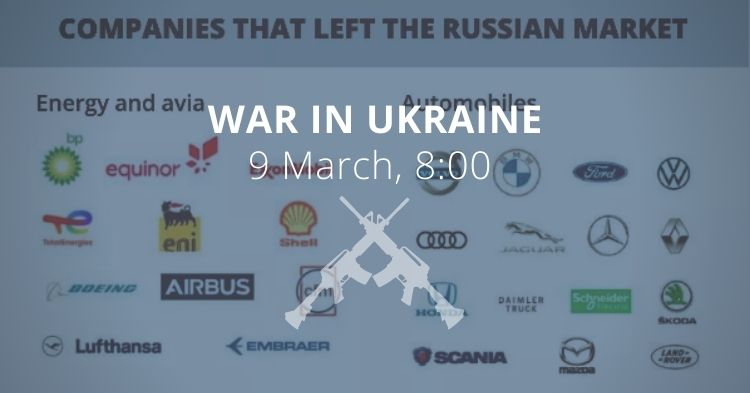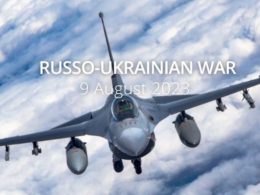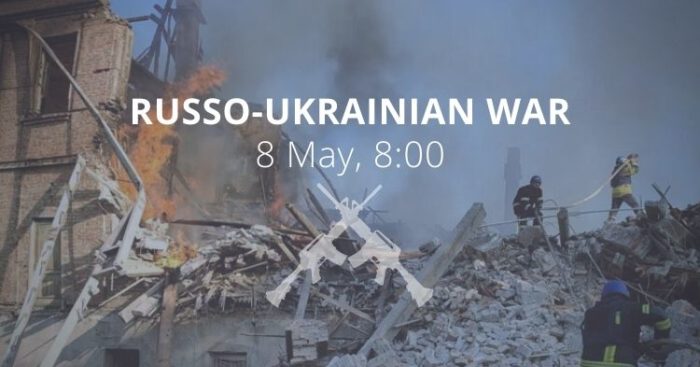Morning report day 14 - March 9
The report is based on media reports, expert analyses and official information posted online.
BTG: Battalion Tactical Group, approximately 600–800 officers and soldiers, of whom roughly 200 are infantrymen, typically equipped with roughly 10 tanks and 40 infantry fighting vehicles.
Situation
According to information from the General Staff of Ukraine as of Operational information on 06.00, 09.03.2022 and [midnight]:
The Defence Forces Group continues to conduct a defence operation within the defined operational zones.
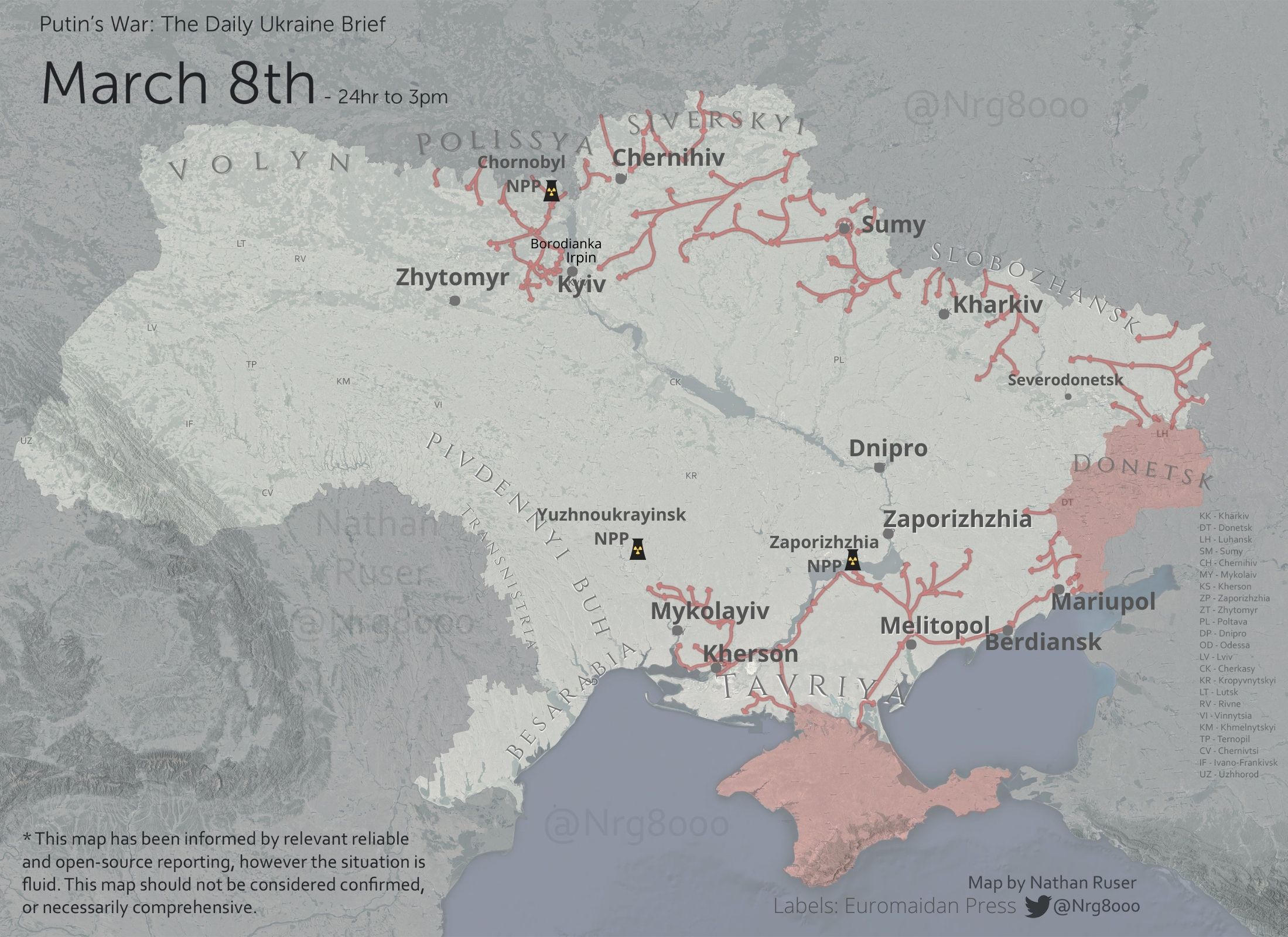
[The main efforts of the enemy continue to focus on:
- encirclement and capture of Kyiv, Sumy, Kharkiv, Mariupol, Mykolayiv, Chernihiv;]
- creation of a land corridor between the TOT of the Autonomous Republic of Crimea and the mainland of the Russian Federation;]
- access to the administrative borders of Luhansk and Donetsk regions.]
The grouping of forces and means of defence of the city of Kyiv repulses the enemy's offensive, inflicts fire damage on its offensive group and firmly holds certain boundaries.
[In the Polissya direction, the enemy continues to hold the previously occupied frontiers and captured settlements, in particular Borodyanka, Kopyliv, Bucha, Demidiv.]
[No active actions by the occupiers were noted in the direction from the settlement of Dymer. In the area of the settlement of Pripyat, with forces up to two BTGr, occupies defence.]
[In the direction from n.p. Babinka, with forces of up to five BTGs, the enemy led the offensive, was stopped and moved to the defence in the area of Bucha.]
[In the area of Buzova, with forces up to 4 BTGr from the 36th General Army (two BTGr from the 5th Separate Tank Brigade and 37th Separate Motorized Rifle Brigade), despite the numerous losses, advanced to the area of Yasnohorodka.]
In the northern and north-western directions, hostilities continue in the Polissya and Volyn operational districts, as well as along the state border of Ukraine and in the settlements of Nizhyn, Ivanytsia, Trostyanets, and the defence of the city of Chernihiv continues.
[In the northern direction, the occupiers did not stop trying to capture the city of Chernihiv.]
[From the area of Hlukhiv [Sumy region], with forces of up to five BTGs from the 90th Tank Division and 4 BTGs from the 2nd All-Military Army of the Central Military District, tried to intervene in the defence of the operative group of the Armed Forces of Ukraine and was stopped. In order to ensure the offensive in the direction of Kozelets is trying to guide and hold the pontoon-bridge crossing.]
[In the Slobozhansk direction, the enemy did not stop trying to block Kharkiv from the north, but, without much success, it also launched missile and bomb strikes on civilian infrastructure in order to intimidate the civilian population. The battle for Izium. The enemy leads pontoon-bridge crossings across the Siversky Donets and Berek rivers.]
[In the Donetsk direction, the enemy continues offensive operations in the directions of the Dnipro and Zaporizhzhia in order to reach the administrative borders of the Donetsk and Luhansk regions. Having carried out an unsuccessful offensive in the Troitskoye district, he tried to resume the offensive in the direction of Zaporizhzhia and capture the city of Mariupol.]
In the Southern direction, operational groups of the defence forces cover the state border of Ukraine and the seacoast, protect, and defend airfields and critical infrastructure.
[In the Tavriya and Southern directions, the enemy forces up to seventeen BTGs hold the settlements of Kherson, Enerhodar, and Vasylivka, and regroup their forces for a further offensive in the direction of Zaporizhzhia by forces of three BTGs.]
In other areas, groups of troops are conducting a stabilization operation and performing territorial defence tasks.
[The Black Sea and Azov operational zones are expected to strike civilian and military targets with cruise missiles from ships of the Black Sea Fleet and the Caspian Flotilla.]
The Air Force of the Armed Forces of Ukraine repels missile and bomb strikes and destroys the means of air attack of the occupiers, provides air cover for important infrastructure facilities of Ukraine and military groups.
According to available information, due to numerous casualties, the enemy continues to conduct covert mobilization under the guise of training camps in the temporarily occupied territory of the Autonomous Republic of Crimea, Krasnodar Krai, and some districts of Donetsk and Luhansk oblasts; intensified activities to recruit volunteers for the war in Ukraine.
In addition, there were cases of expulsion of young men of conscription age from higher educational institutions of the Russian Federation in order to replenish the reserve of the army of invaders.
The occupiers do not rule out the possibility of involving up to 800 servicemen of the unrecognized Transnistrian-Moldavian
republic in the war with Ukraine, but the moral and psychological condition of these personnel remains low.
[According to the available information, the occupiers are considering the issue of organizing the effective provision of their own troops with fuel through the use of the existing stationary network of automobile gas stations and oil storage facilities.]
[Also, the enemy plans to create a network of field pipelines in the temporarily occupied territory of Ukraine, with the possibility of connecting them to the central oil pipeline and pumping fuel from the territory of the Republic of Belarus.]
[In the course of hostilities on the territory of Ukraine the occupiers continue to suffer significant losses. Thus, according to available information, 14 separate special purpose brigades (Khabarovsk) lost more than 400 servicemen (to be specified), BTGr of the 25th separate motorized rifle brigade (Luga) of the 6th all-military army was withdrawn to the territory of the Russian Federation due to loss of combat capability.]
According to the available information, panic is spreading among the personnel of the occupying forces due to the huge losses in manpower and equipment.”
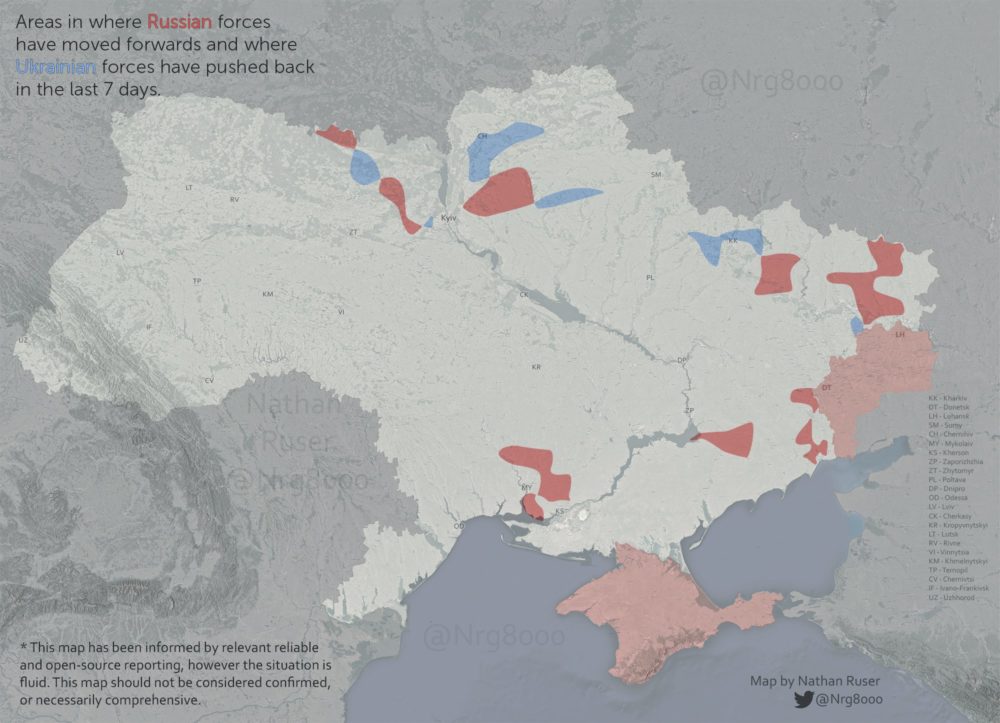
According to British Defence Intelligence, Ukrainian air defenses appear to have enjoyed considerable success against Russian modern combat aircraft, probably preventing them from achieving any degree of control of the air.
According to the Centre for Defence Strategies, Ukraine has taken approximately 2000 Russian prisoners of war.
Russian prisoners in Ukraine will be treated following the norms of international humanitarian law, subsequently, they will work to restore the Ukrainian economy, First Deputy Minister of Internal Affairs of Ukraine Yevhen Enin said.
Since the beginning of the Russian invasion of Ukraine, 100,000 Ukrainians have joined the territorial defence, the National Guard said on its Facebook page 4 days ago (the evening of March 5), RFERL reports. Additionally, between 20,000 and 40.000 have joined the Ukrainian “foreign legion of volunteers.” According to Dean Blundell, there are so many Canadians that they have organized them into a separate unit (500 and growing).
As of 09.03.2022 morning, the approximate losses of weapons and military equipment of the enemy of the Russian Armed Forces from the beginning of the war to the present day:
- personnel – more than 12.000 people (no change),
- tanks – 317 units (+14),
- armoured combat vehicles – 1070 units (+34),
- artillery systems – 120 (no change),
- multiple rocket launchers – 56 (no change),
- air defence means – 28 (+1),
- aircraft - 49 (+1),
- helicopters - 81 (+1);
- automotive technology – 482 (+8),
- light speedboats - 3 units (+1),
- fuel and lubricant tanks – 60 (no change),
- UAV operational and tactical level – 7 (no change).
Humanitarian
The National Security and Defense Council has set up a website to search for Russian prisoners of war, RFERL reports. The staff of the National Security and Defense Council of Ukraine has created the site "Occupier", which provides information about prisoners of war of the Russian Armed Forces, who invaded the territory of Ukraine, starting from February 24, 2022.
On February 27, the Interior Ministry launched a website to identify dead and captured Russian servicemen. In Russia, the site was blocked, but the telegram channel "Look for your own" continues to work.
On February 26, a hotline "for all those who lost a Russian soldier somewhere on Ukrainian soil" was launched.
According to Ukrainska Pravda the situation in the regions are as follows:
- Kyiv Oblast The enemy tried to enter Irpin at night. The attack was repulsed. A rocket attack was carried out on Boryspil in the evening. One missile was destroyed, one hit the technical premises of the airport. There are wounded. During the night, several air-raid alarms. The region is preparing for evacuation from hotspots
- Kirovohrad, Volyn, Kherson - the night was calm
- Zhytomyr Oblast Two airstrikes in the evening. A dormitory building was destroyed in Zhytomyr, and one of the city's enterprises was previously hit (to be specified). Bombing of Malyn. Several private houses were destroyed.
According to preliminary data, 9 people died as a result of airstrikes.
- Rivne Oblast, Vinnytsia Oblast, Khmelnytsky Oblast, Ternopil Oblast, Cherkasy, Lviv Oblast, Chernivtsi, Ivano-Frankivsk, Zakarpattia. The night was calm
- Chernihiv Oblast During the night and morning constant air alarms Chernihiv, Nizhyn, Oster, Desna. Defensive battles on the outskirts of Chernihiv. At night, the Russian army fired on the outskirts of Chernihiv. 10 residential buildings were damaged according to preliminary information.
- Sumy Oblast. In general, the night was quiet in the region, except for the Okhtyrka district and the city of Okhtyrka. They were bombed again by Russian aircraft, currently, there is no connection. Negotiations on the "green corridor" from Sumy lasted all night.
- Poltava Oblast. The night was calm, in the morning the air alarm in Lubny. Two stages of evacuation from Sumy were completed successfully! 5,000 people and 1,000 private cars are safe.
- Luhansk. Shelling of Sievierodonetsk, Rubizhne and Kreminna, fires in the residential sector due to shelling. No gas, partly water and light. There is almost no Internet and communication. People are switching to national roaming. Yesterday saw heavy shelling of Sievierodonetsk. One civilian died.
- Donetsk. In Kramatorsk air alarm. In Mariupol - humanitarian aid did not arrive. The Russians bombed the building of the Red Cross - international and our, Ukrainian. There is no water, electricity, gas, food, medicine.
- Odesa, Mykolayiv Oblast, Dnipro - the night passed quietly
- Kharkiv Regional Center holds the defense, there were no active offensives. Fighting continues in Izium, in Chuguev and Dergachi shells are hitting residential buildings.
Legal
Germany’s federal prosecutor has opened a probe into suspected war crimes by Russian troops since the invasion of Ukraine, amid international outrage over attacks on civilians and critical infrastructure, Aljazeera reports.
Evidence of the commission of war crimes by Russian forces in Ukraine is rapidly accumulating. Intergovernmental organizations are launching investigations, and Ukrainian citizens and reporters on the ground, using cell phone cameras, are recording such atrocities and bringing them to world attention, except in Russia, China, and other states trying to keep the truth from their citizens - writes Aaron Rhodes for HRWF (Human Rights Without Frontiers)
According to the General Staff of Ukraine:
- During Tuesday, the enemy reduced the pace of the offensive operation, using mainly missile and bomb strikes on civilian infrastructure.]
- In Berdiansk, the enemy began to distribute propaganda materials aimed at discrediting the military and political leadership of our state.
- In settlements of the Chernihiv Oblast, which are temporarily occupied by Russian troops, the enemy, in violation of international humanitarian law, continues to hide weapons and military equipment among residential buildings and agricultural premises. Uses a network of medical facilities to provide medical care to wounded personnel. The occupiers are dismantling the cell towers.
- In the Kherson area, it is revealed that the servicemen of the Armed Forces of the Russian federation disguised in civilian clothes, were sent forward in the direction of the city of Mykolaiv.
Environmental
On Thursday 3 March the National News wrote:
“We are very concerned that an extended conflict in Ukraine could limit the world’s supply of staple crops like wheat, corn and sunflower oil, resulting in the skyrocketing of food prices and hunger,” Rome-based IFAD said. “This could jeopardise global food security and heighten geopolitical tensions.”
Russia and Ukraine are two of the world's major staple grains markets, and the conflict is prompting countries that rely on imports from them to seek alternative suppliers.
The Black Sea plays a major role in the global food trade, exporting at least 12 per cent of the food calories traded in the world, according to IFAD. Russia and Ukraine account for more than a quarter of the global wheat trade and nearly a fifth of the corn trade.
“The continuation of this conflict, already a tragedy for those directly involved, will be catastrophic for the entire world, and particularly those that are already struggling to feed their families,” the agency warned.
Support
Poland has agreed to hand over all of its MIG-29 fighter jets to a US airbase "immediately and free of charge" as part of a plan to provide aircraft to the Ukrainians, Sky News report. Washington has been looking at a proposal under which Poland would supply Ukraine with Soviet-era fighters and in turn receive American F-16s to make up for their loss.
The Ministry of Health of Israel announced that next week the Ministry of Foreign Affairs and the Ministry of Health of this country will send an Israeli medical delegation to Ukraine, which will open a field hospital as part of humanitarian aid to the Ukrainian people, RFERL reports. According to some sources, a medical institution will be deployed near Lviv, informs the Israeli newspaper "Details".
Putin turns Russia into the world’s most-sanctioned country, dwarfing Iran and North Korea, Washington Post reports.
“It took less than two weeks for Russian President Vladimir Putin to turn his country into the most-sanctioned nation in the world, dwarfing the high sanction totals imposed on the likes of Iran, North Korea and Syria, thanks to Russia’s invasion of Ukraine.”
Data from Castellum.ai, a global database that tracks sanctions, shows that its new total is a whopping 5,532 sanctions. Russia’s sanctions more than doubled the 2,608 sanctions imposed on Syria, and far outpace the 2,077 sanctions placed on North Korea.
Yale School of Management maintains a current list of companies that have curtailed operations in Russia as well as those that remain. 300 companies have announced their withdrawal from Russia since 24 February.
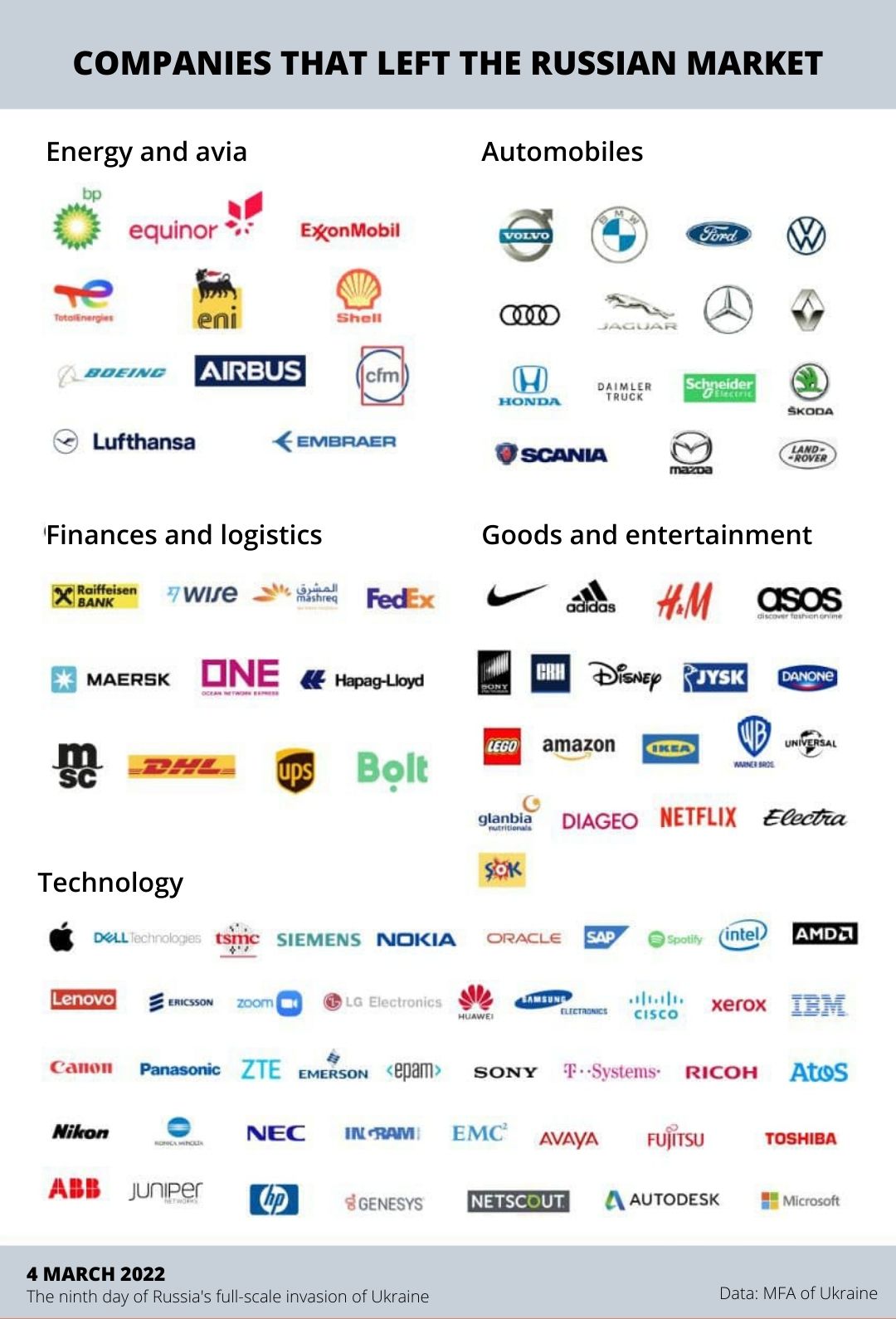
- Read more: International sanctions slam Russia’s finance, economy, culture, sports: a list (3 March)
According to Fortune,
“Companies that fail to withdraw face a wave of US public resentment. A new Morning Consult survey reveals that over 75% of Americans demand corporations cut business ties with Russia after the invasion of Ukraine.”
New developments
- Pakistan has expressed its desire to play a role in the de-escalation of tensions between Russia and Ukraine via mediation and table talks amid the ongoing Moscow-Kyiv war, Gulf Today reports.
- The ceasefire talks between Russia and Ukraine are at a critical juncture, Israeli officials said today, Axios reports. ”Israelian officials with direct information about the talks coordinated by Israel said they feel there is a softening of positions on both sides in the last 24 hours, with the Russians saying they only want to demilitarize the Donbas region and Zelensky telling ABC news he has “cooled down” about joining NATO.”
- Ukrainian Foreign Minister Dmytro Kuleba late Monday confirmed that he will meet with his Russian counterpart Sergey Lavrov on the sidelines of the Antalya Diplomacy Forum [10 March] following Türkiye’s proposal to bring the two top diplomats together amid continuing tensions, the Daily Sabah reports.
Assessments
Michael Clarke, former director general of the Royal United Services Institute (RUSI), has told Sky News why the Russian military appears to be struggling in Ukraine.
[The picture is murky. According to New York Times Tuesday, “satellite imagery analyzed by military analysts suggests that roughly 950 Russian vehicles, including 140 tanks, have been destroyed or damaged, according to Justin Bronk, a research fellow for airpower and technology at the Royal United Services Institute, a London think tank that specializes in security issues. That represents only a fraction of the invasion force but is still striking.]
Ukrainians have lost less than 250, which they can afford.
"Any side retreating you would expect to lose some equipment because you have to leave the equipment behind," Mr Clarke says. "You try and blow it up, disable it and you clear off. "If you're attacking, you don't expect to have your equipment abandoned or captured, which indicates that Ukrainian counter-attacks, local counter-attacks must be doing quite well."
Ukrainian sources say Russia has lost 11,000 troops but verifiable sources put the figure closer to 10,000, according to Mr Clarke. He says this is much worse compared to the conflict in Afghanistan, in which Russians lost 15,000 troops in about nine years.
"That loss of 15,000 back in the '80s started to have a big effect on public opinion in the Soviet Union, so what effect 10,000 in 10 days will have... even though the Russian public doesn't hear much about this, mothers don't know what's happened to their sons," he says.
"They don't know what's happened to these boys because nobody's been brought back. The Russians took crematoria with them - mobile crematoria. "These bodies are being cremated where they fall. "They're not being returned home, but their mothers will wonder where on earth they are."
[The former US Ambassador to Russia Michael McFaul called on the mothers of Russian soldiers to end the war, Republicworld.com reports. His tweet reads, "Mothers of Russian Soldiers - The Union of Committees of Soldiers' Mothers of Russia - you helped stop the unjust and brutal war in Chechnya in the 1990s. Rise up and stop this new war! Save your sons now before it's too late."
“The Union of Committees of Soldiers' Mothers of Russia (CSMR) was founded in 1989 to bring back their soldier sons early from military service. In November 1994, when the war broke out in Chechnya, CSMR was rallying against the war. Hundreds of women led by CSMR marched to Chechnya to take their sons away from the war. Referring to the same in his tweet, McFaul wants CSMR to repeat history.”]
"At the moment, they're about to run out of available troops, because they committed about 190,000 to this operation," Mr Clarke says. "And they're all now there. There will be a few thousand held back, but not many. "So they're more than 90% committed to this operation."
He says it looks as though Russia is sending more troops from the far east which look as if they're going to arrive in four or five days. They appear to be arriving in non-military vehicles like minivans. "The problem the Russians have got is in trying to occupy a country that doesn't want you there," Mr Clarke says. He says this means they have to leave troops behind to keep areas under their control - which they would not have to do if they were liberating people, as they claim.
"They've got three main axes of attack: through Kyiv, in the south in Mariupol to link up with the north, and in the west towards Odesa," he says.
"All of those lines of attack are now running out of steam, because they're having to leave so many troops behind, and they're not really in control. "The one city that they've got is Kherson in the south, and they're not really in control of that either."
Mr Clarke says a Russian convoy headed towards Kyiv has not moved in six days - a major issue for its planned attack on Kyiv. He agrees that it's a "sitting target" and says Ukrainian forces are attacking it effectively using drones.
Ukrainian troops have their own drone called the Punisher drone, which is electric and carries one bomb. "It's stealthy - because it's electric it can't easily be picked up," Mr Clarke says.
"They're being clever because what they're doing is they're attacking the fuel. "This convoy contains about 15,000 troops - it's basically an armoured division and probably about 230 tanks. "They're not attacking the tanks; they're attacking the fuel.”
"They're holding it in place by denying it the ability to sort itself out. They're keeping the traffic jam jammed." He says the latest information we have is that the convoy is trying to back up to create a bit of space and "not doing very well".
At the moment Russian forces are fighting in Mykolayiv - which they need to take in order to get to the southern port city of Odesa, Mr Clarke says.
He says Russians have about 30 warships in the Black Sea, of which six are assault ships.
"There's a naval assault waiting to go in on Odesa when the ground forces get there," he says - but "they've been waiting a while".
He says there is also a possibility of an attack on the other side of Odesa from the West, from Russian troops who are over the border in Moldova in the Transnistria district.
"It's possible that Odesa could be attacked from east, west and south by the sea. "It won't be a comfortable position to be in but the Odesans at the moment are determined not to roll over."
What are the chances of Putin being deposed in a coup?
Mr Clarke says: "I think Putin's finished - he'll either go quickly or it'll be maybe two or three years." He says the Russian president has made a "massive strategic blunder". "There is no recovery from this, there's no way back for him."
He says it is unlikely there will be a popular revolution in Russia "because there's no mechanism for it" and Mr Putin is not that unpopular with "ordinary Russian people" in the central and eastern parts of the country.
But the middle classes do not like him and the oligarchs are worried about him because he is now interfering with their ability to make money.
"His fate will be Julius Caesar's, which won't be necessarily a physical assassination, but somebody will put the knife in politically," he says. "When one person does, they'll all join in," he says.
"That's the fate that now awaits him," he says. "And only China can save him."

